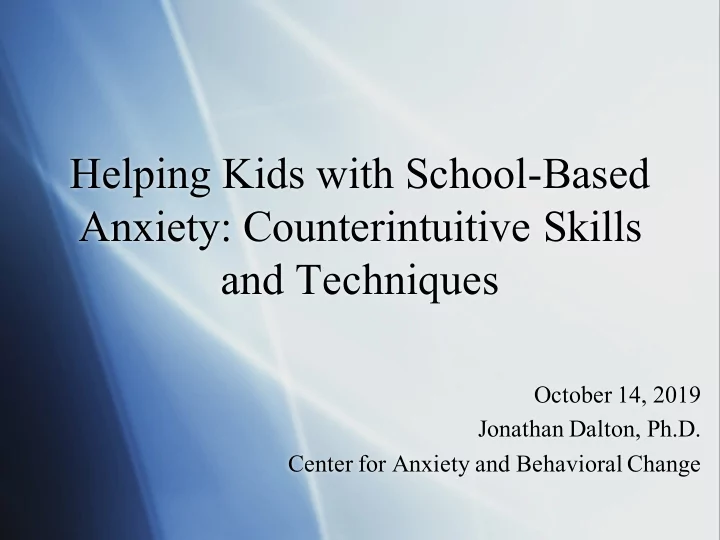

Helping Kids with School-Based Anxiety: Counterintuitive Skills and Techniques October 14, 2019 Jonathan Dalton, Ph.D. Center for Anxiety and Behavioral Change
Intelligence, Creativity, Compassion…
“Having an anxiety disorder is like being stuck in that moment when you realize you’ve leaned too far back in your chair, but have not yet fallen.” – teenage patient
Adaptive Anxiety vs. Disordered Anxiety Adaptive Anxiety Disordered Anxiety § Keeps us safe § Results in functional impairment § Equivalent to a “false § A response to real danger alarm” § Leads to unnecessary § Prevents the repeating of avoidance mistakes
Why this is so important Children and Adolescents § Median age of onset 11 – earliest of all forms of psychopathology § 8 % of children between ages 13 and 18 currently have an anxiety disorder § 31.9% will have an anxiety disorder between the ages of 13 and 18 § 8.3% will have “ severe ” anxiety disorder § Only 18 % of these teens receive treatment
Adolescents Girls § 38% of girls will have at least one anxiety disorder between the ages of 13 and 18, (compared with 26.1% for boys) § Compared with 4.2% of girls will have ADHD, 10.2% with have a substance abuse disorder, 3.8% will have an eating disorder
It Didn’t Use to be This Way § Teens are 5 to 8 times more likely to show symptoms of an anxiety disorder compared with teens during WWII § Depression in teens increased by 37% between 2005 and 2014 § College freshmen report highest stress and lowest mental health in 25 years
Now put this in terms of applying to college
Where Does it Come From? § Doing well in school………..43% § Family finances…..…………31% § Getting into good college...…29% § The way I look/weights…..…26% § Managing extracurriculars….12% § Friends…………………....…11% § Family conflict…………….…7%
Anxiety and Learning Differences § Estimates range from 20 to 40% of children with LD also suffer from an anxiety disorder § Most research has examined ADHD and anxiety disorders
Treatment Works! “ Ultimately we know deeply that on the other side of every fear is freedom ” – Marilyn Ferguson § Treatment success rates for anxiety disorders with CBT (exposure therapy) range from 60% to 90% § Tragically low utilization rates (18% compared with 79% for ADHD)
“You have a Ferrari nervous system. You won the lottery, but you need some special training to be able to drive it.”
Avoidance and Fear are Teammates
Anxiety Reduction § Education § Cognitive Reframing § Behavior Change
Fire alarm at the top of the Empire State Building
“Stop swatting the butterflies.”
“Anxiety is the Baskin Robbins of mental disorders” § Panic Disorder § Separation Anxiety Disorder § Generalized Anxiety Disorder § Post Traumatic Stress Disorder § Social Phobia § Specific Phobia § Selective Mutism § Obsessive Compulsive Disorder *
“Behind the Scenes Footage of Your Own Scary Thoughts”
How Anxiety Affects the Learning Process § Working memory has a limited capacity § Intrusive thoughts compete for limited resources § Threat cues are prioritized in cognition § Fatigue occurs more quickly
“Imagine trying to learn calculus right now”
Self-Oriented Perfectionism § Very different from appropriately high standards § Risk factor for eating disorders, depression, suicide § Self-worth derived from achievement and productivity § Tend to function well in low stress environment
“The perfect igloo can kill you.”
Teaching “Optimalism” § Optimal – “Best or most effective” § Failure as feedback § Adaptable and flexible § Accepts natural variation § Balance as goal § Success is not linear
Flexibility is Strength
“It can be hard to let go of what you know.”
Accommodating vs. Enabling
“The Protection Trap” Anxiety is Temporary and Harmless; Avoidance can Ruin Lives § 40% of parents of children with anxiety disorders have also had an anxiety disorder § Good parents are motivated to reduce a child’s distress. This often leads them to become complicit with child’s avoidant behavior
Ways to Reduce Problematic Behaviors § Punishment § Usually has a higher correlation with the mood of parent that behavior of child § Extinction § Necessary but rarely sufficient § Reinforcement of incompatible positive behaviors (positive opposites) § Foundation of most successful behavior plans
“Here is some food. Now go away and don’t ever beg again!”
Basic Template for the Treatment of Anxiety Disorders in Adolescents § Assessment § Psychoeducation § Cognitive Reappraisal Strategies § Exposure § Parent Training § Relapse Prevention
Psychoeducation “ Here is the owner ’ s manual for you nervous system ” § “ Good package deal ” § Acquisition, maintenance, and extinction of fear response § Importance of decreasing avoidance § Concept of exposure § Outlasting fear
“No good parent would just give their child the answer. They need to learn how to solve it.”
“Model what you want the child to fee;.”
“Water the seeds, not the weeds.”
Cognitive Reappraisal of Anxious Arousal “ Don ’ t believe everything you think! ” § Body is doing the right thing at the wrong time § Perspective of “ curious observer ” § “ In this moment… ” § Metaphor of fire alarm
Coping Cards “ Just because I ’ m scared… ” § I am stronger than my § Just because I ’ m fear scared doesn ’ t mean I can ’ t do it § Scary thoughts can never hurt me § It ’ s ok to be scared § I know I can do this § Just do it anyway because… § Anxiety is temporary and harmless
Which is the Path to Success?
Ray Charles
Jonathan Dalton, Ph.D. Center for Anxiety and Behavioral Change www.changeanxiety.com drdalton@changeanxiety.com 301-610-7850
Recommend
More recommend